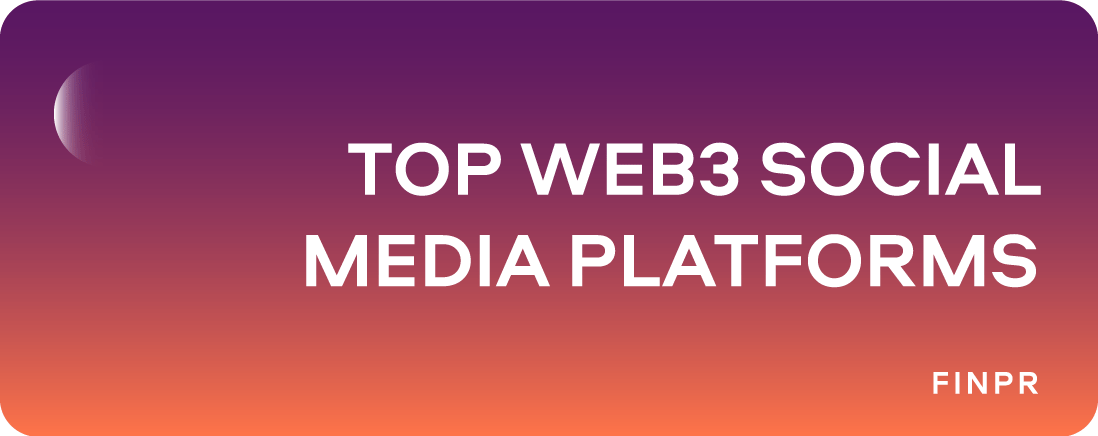
Social media are an integral part of our daily lives, shaping the way we communicate, share information, and even do business. But as we navigate through the likes, shares, and retweets, there's a seismic shift happening beneath the surface - a shift towards a more decentralized, secure, and user-centric model known as Web3. This groundbreaking technology in 2025 is a revolution that promises to redefine the very fabric of social media.
Do you want to become a top Web3 company? Take a look at decentralized social media platform, maybe it can be a good place to expand your project and audience. So, why is Web3 causing such a buzz in the tech world? How does it differ from the Web2 platforms we've grown so accustomed to? And most importantly, what are the top Web3 social media platforms that are leading this change?
If you're a social media enthusiast, a tech-savvy individual, or someone curious about the future of online networking, this article is your one-stop resource for understanding the transformative impact of Web3 on social media. Fasten your seat belts as we embark on this exciting journey to explore the future of social networking in a decentralized world.
6 Best Web3.0 Social Media Platforms in 2025
1. Diamond App
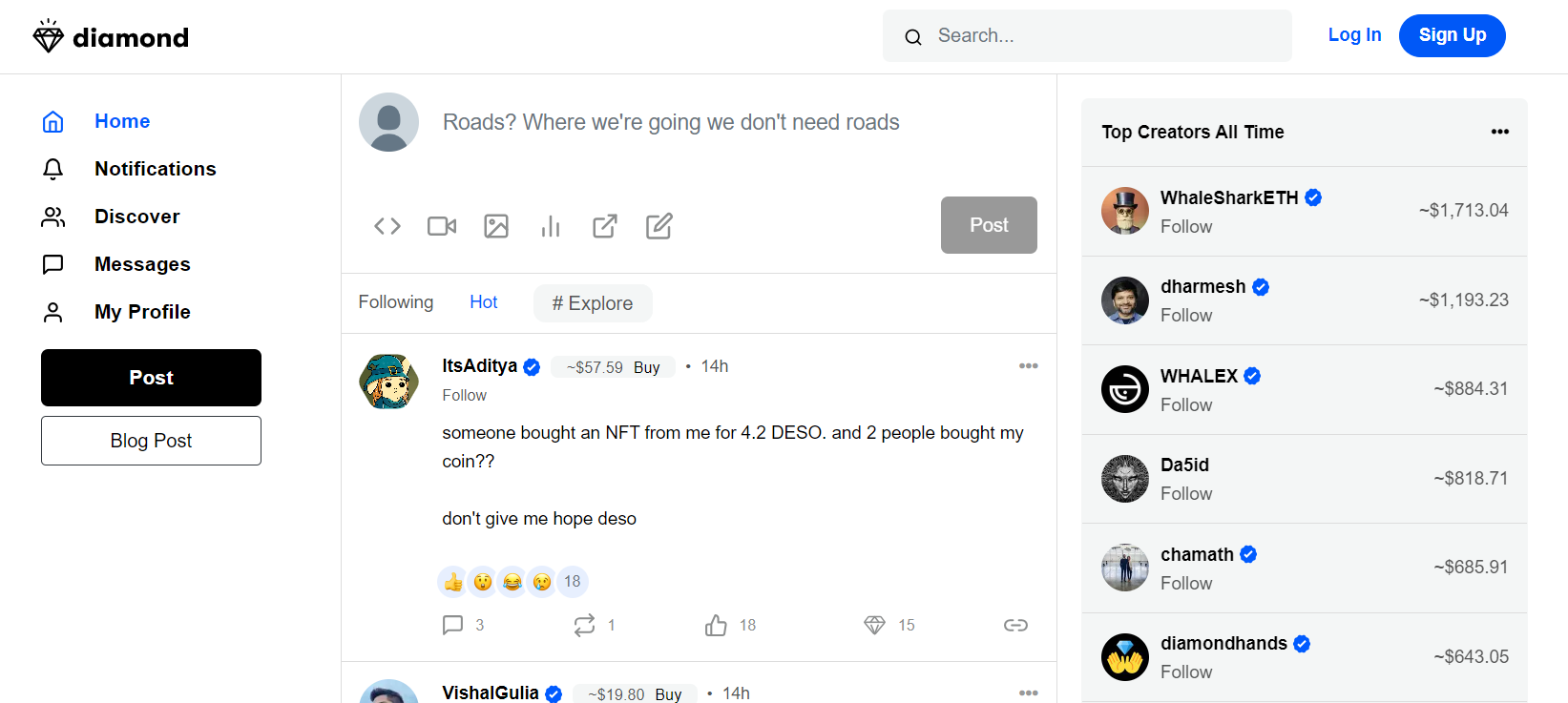
Diamond App is a revolutionary social media platform that operates in the Web3 space. Unlike traditional social media platforms that are centralized, Diamond App is built on DeSo (the Decentralized Social Blockchain), offering a new level of engagement between creators and their audiences. One of the standout features of Diamond App is its unique blend of social media and investment opportunities. The platform allows creators and their audiences to build an engaging online community centered around content, incentives, and ownership. This makes it a perfect fit for those who are looking to monetize their online presence or invest in creators they believe in.
Technologically, Diamond App is built from the ground up as its own custom blockchain. Its architecture is similar to that of Bitcoin but is designed to support complex social network data at a larger scale. This ensures that the platform can handle a large volume of interactions without compromising on speed or security. Diamond App is a fully open-source project, meaning that it's not controlled by any centralized authority. This aligns with the ethos of Web3, which aims to give more power and privacy back to the user. Despite being decentralized, the platform offers functionalities similar to Web2 platforms, such as posting, sharing, and messaging, making it a familiar yet improved experience for users.
Key features of the platform:
- Monetization for Creators: Creators can earn directly from their communities through tips and creator coin buys. All content is fully on-chain, offering a transparent and direct monetization path.
- Web3's Most Versatile Multichain NFT API: Diamond App also incorporates NFTs, expanding the possibilities for creators to monetize and engage with their audience.
- Interoperability with Other Platforms: As a multichain platform, Diamond facilitates interactions across various blockchain networks, enhancing its accessibility and reach.
2. Audius
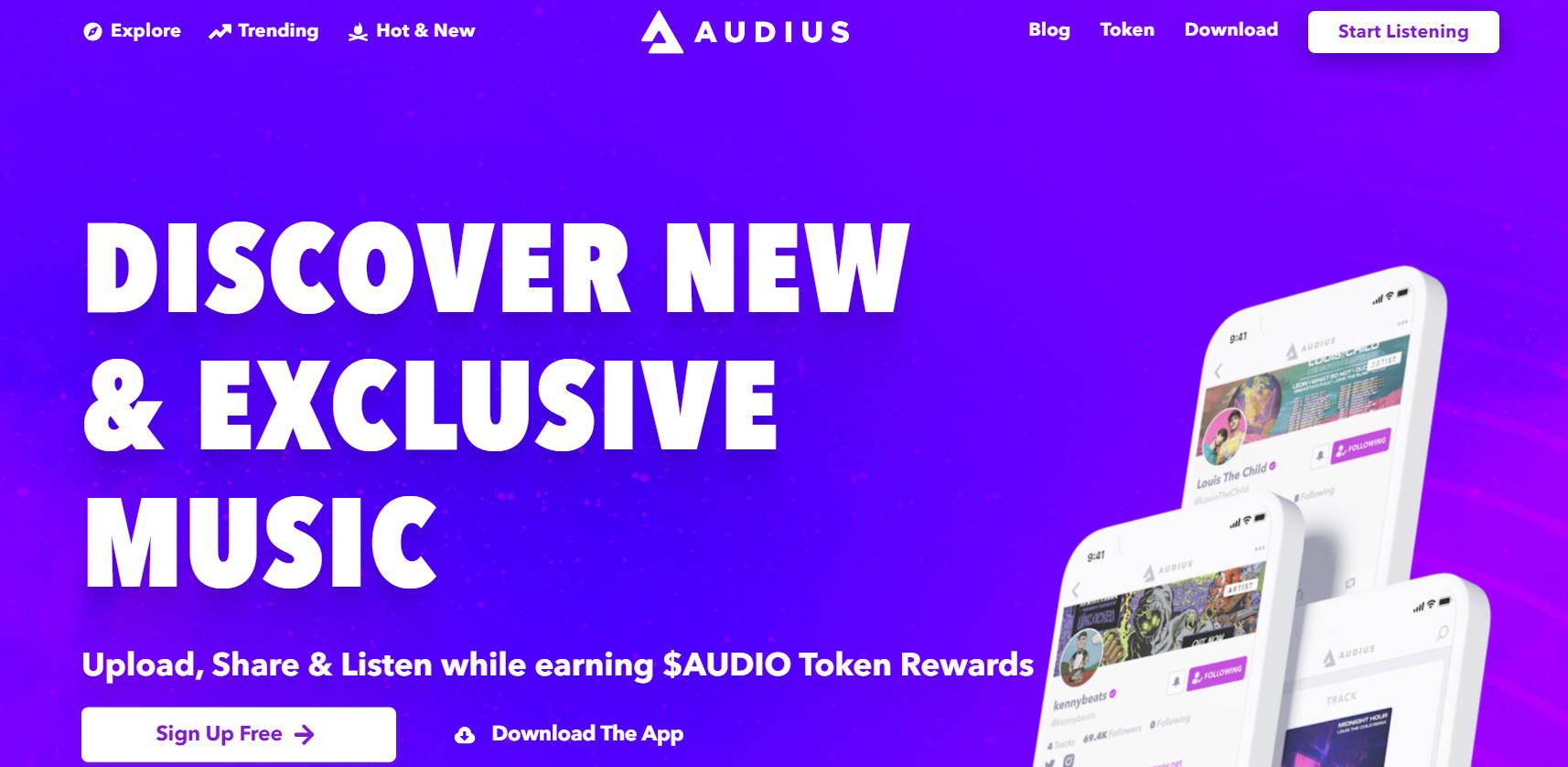
Audius is a blockchain-based social media platform that caters specifically to the music community, including both creators and listeners. Audius leverages blockchain technology to offer a more decentralized approach. This ensures that artists have greater control over their work, and it also allows for more transparent and direct transactions between artists and their fans. The platform uses audio tokens, which are tradeable on several cryptocurrency exchanges, providing a unique monetization model that is still evolving.
What sets Audius apart is its use of blockchain technology to timestamp audio files at the time of upload. This feature not only ensures the authenticity and originality of the content but also provides a secure and transparent way to manage digital assets. While the platform is still in the process of fine-tuning its monetization strategies, the existing framework offers promising avenues for artists to earn through their music. The decentralized nature of Audius gives it an edge in promoting user-owned content, making it a compelling choice for those looking to break free from the constraints of centralized platforms.
Key features of the platform:
- Direct Artist-Fan Connection: It enables artists to upload their music directly to the app, facilitating a direct connection with their fans.
- Large Music Catalog: The platform boasts a diverse catalog, including works from renowned artists like deadmau5, Katy Perry, Steve Aoki, Jason Derulo, and NAS, as well as independent artists.
- Collaboration and Remixes: Artists on Audius are encouraged to collaborate, allowing for remixes and the creation of exclusive content.
3. Minds
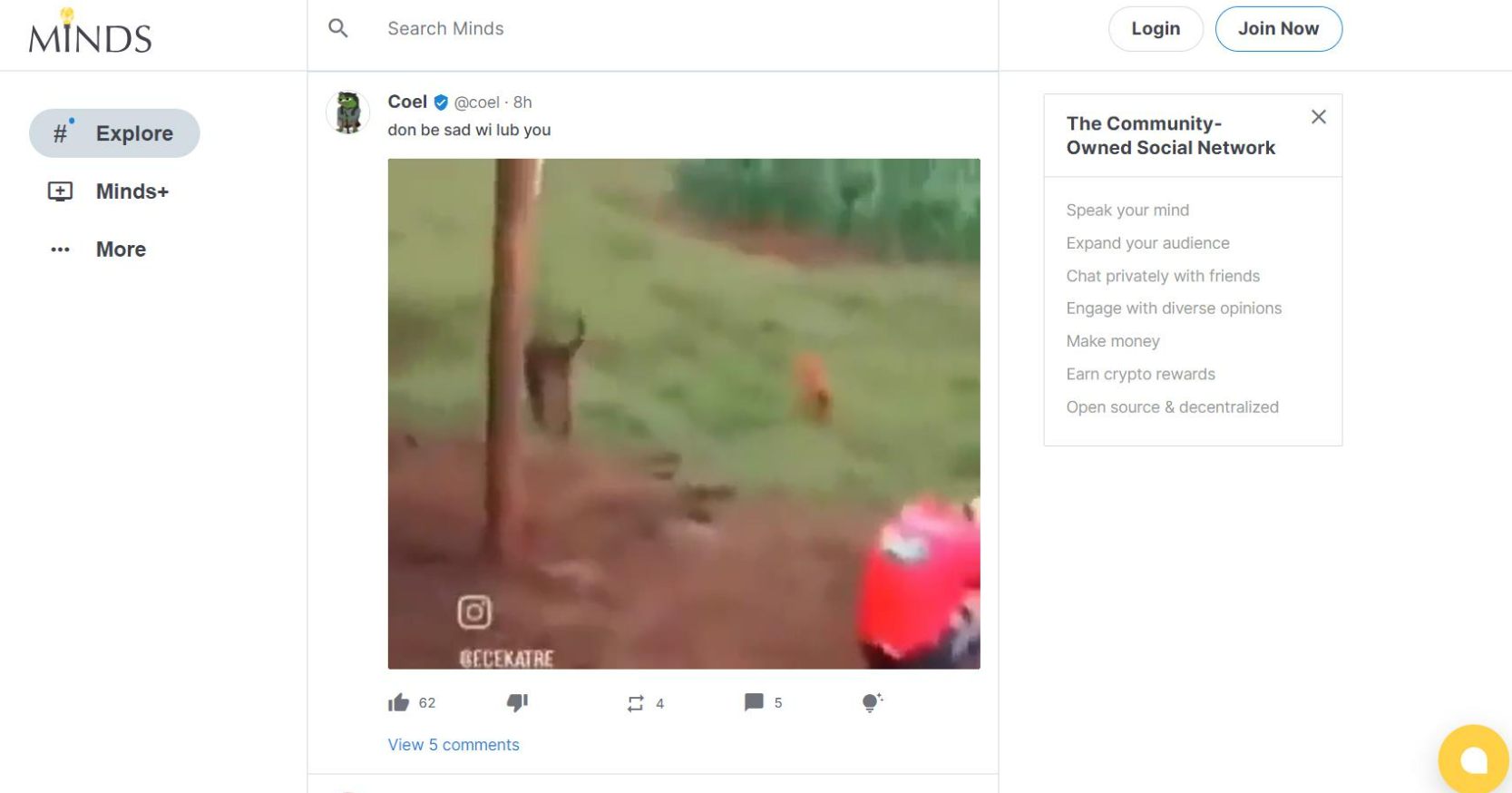
Minds is a decentralized social media platform that stands out for its commitment to privacy, free speech, and user empowerment. Built to offer a decentralized and encrypted network, Minds gives users full control over their data. The platform has successfully raised $10 million in funding from Futo, a tech freedom organization. As of now, Minds boasts a user base of 5 million, with 300,000 monthly active users. The platform leverages blockchain technology to ensure transparency and resistance to censorship. One unique feature is the 'Minds Jury System,' a community management moderation system where users report inappropriate content and a jury of 12 random active users votes on the case. If 75% of the jury votes in favor, the verdict is made, ensuring a democratic approach to content moderation.
Minds is not just about social interactions. It's also about rewarding users for their engagement and content creation. The platform has its own token system that incentivizes user activities. Whether you are posting, sharing, or even reporting content, you have the opportunity to earn tokens. These tokens not only symbolize your contribution to the community but also could potentially be used for various utilities within the Minds ecosystem.
Key features of the platform:
- Content Monetization: Minds enables users to control and monetize their content through these tokens.
- Encrypted Messaging and Live Broadcasting: The platform incorporates features like encrypted messaging and live broadcasting.
- Points-Based Reputation System: Minds uses a points-based system to manage the reputation of its users, fostering a sense of community and trust.
4. Mastodon
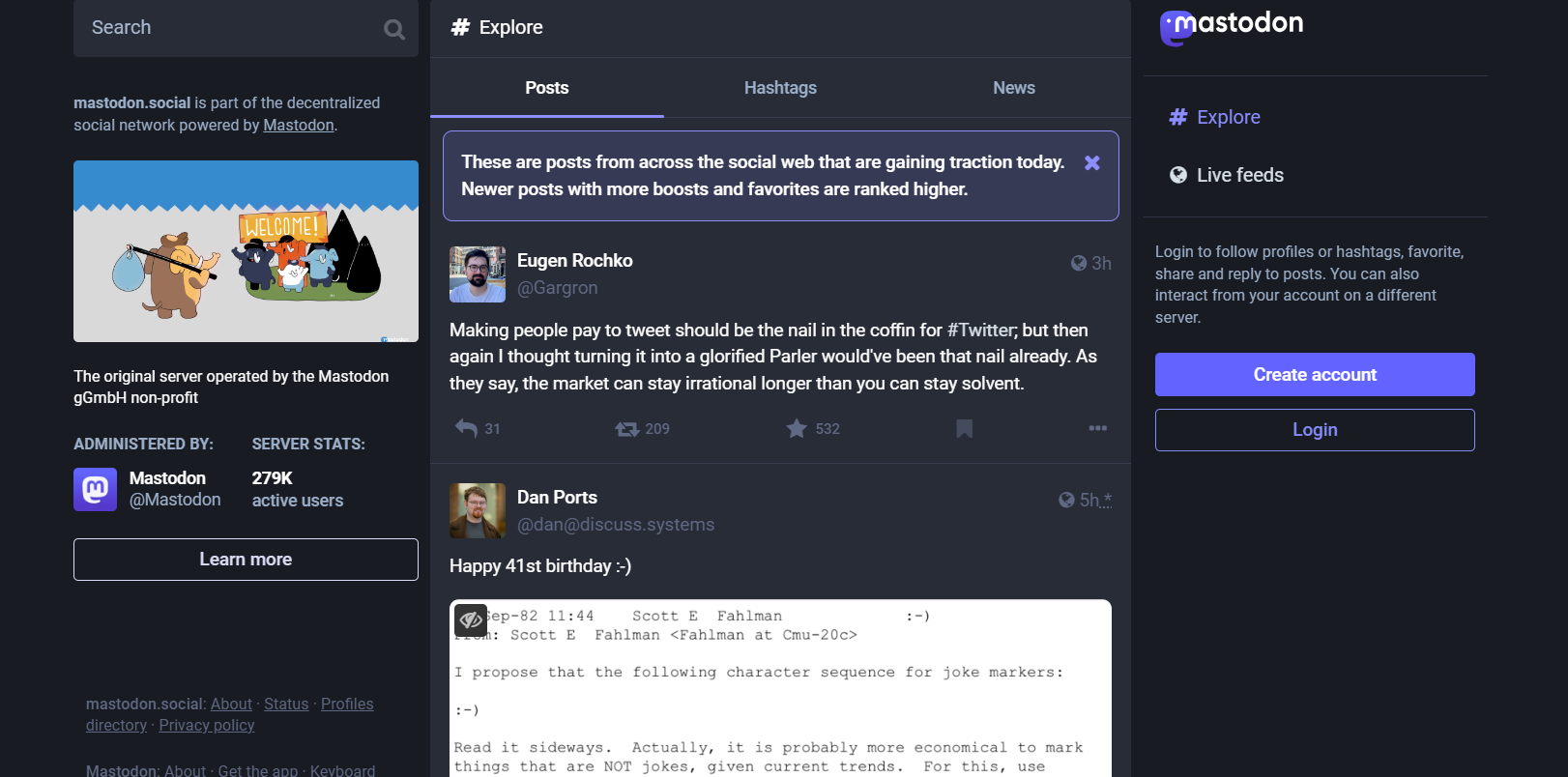
Mastodon stands out as an open-source, decentralized social network based on the ActivityPub protocol. Mastodon allows users to create their own independent instances. This means that anyone can launch their own version of Mastodon without being required to join the main server cluster. This unique feature provides users with complete autonomy over content creation and moderation rules within these individual instances.
One of the key advantages of Mastodon is that it offers a more user-centric approach to social networking. Users enjoy greater control over their data and content, as well as increased security due to its distributed architecture. The platform is built to prioritize user privacy and freedom of expression, making it a popular choice among those who are wary of the data collection practices of traditional social media platforms. As web3 technology continues to evolve, Mastodon is poised to be a significant player in the new era of decentralized, user-focused social media platforms.
Key features of the platform:
- Privacy Features: Users can set varying privacy levels for their messages, choosing to make them public, private, unlisted, or direct. Accounts can also be marked completely private.
- Local and Federated Timelines: Mastodon aggregates messages in real time, displaying them in either local timelines (specific to a server) or federated timelines (across all servers). This allows for broader communication across the platform.
- Community-Based Moderation: Each server on Mastodon can set its own rules and moderation policies, allowing for tailored content and community standards. Users can join servers that align with their preferences or even host their own server.
5. Chingari
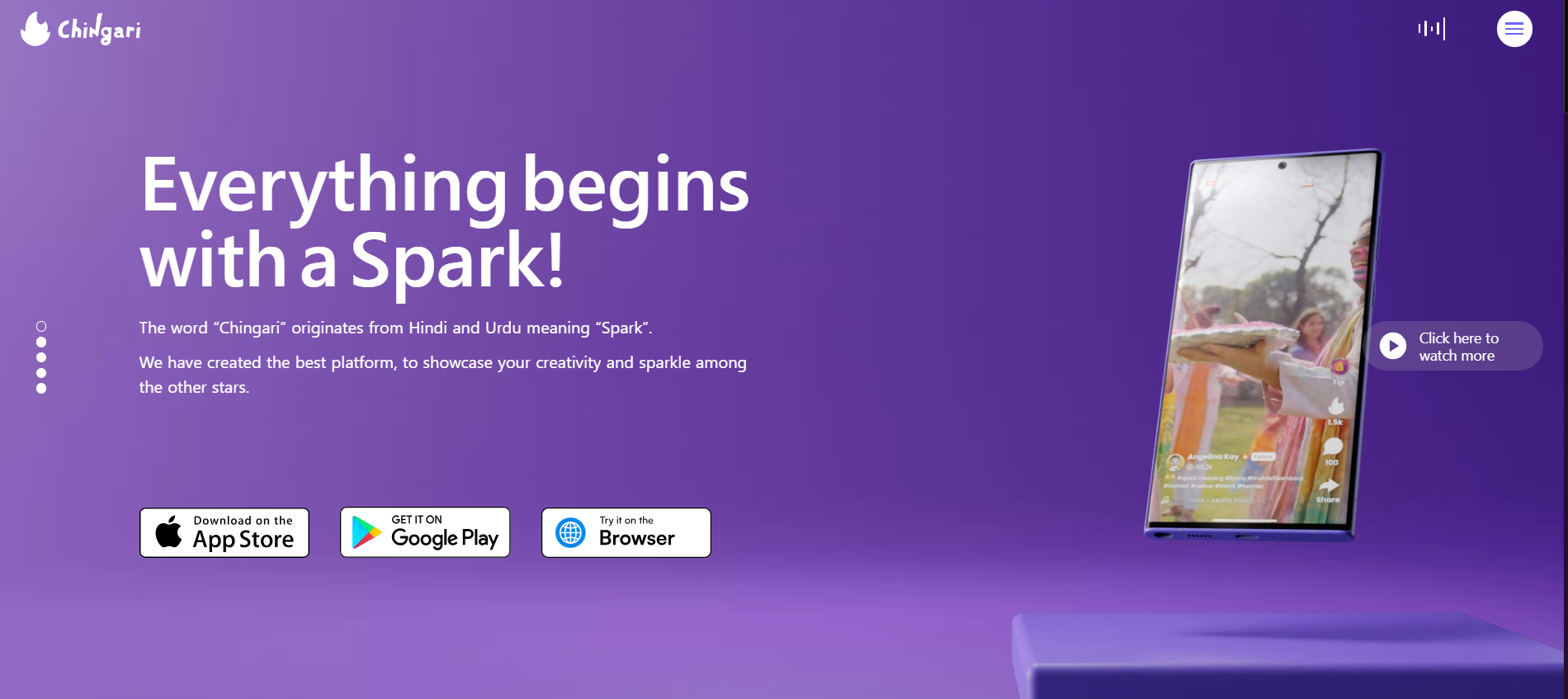
Chingari is not just another social media platform. It's a phenomenon that has taken India by storm. Originating in India, Chingari filled the void left by the ban on TikTok in 2020, offering a platform for short video-sharing. What sets it apart is its focus on localized content, supporting a multitude of Indian languages. This feature makes it incredibly inclusive, allowing users from diverse linguistic backgrounds to engage with the platform effortlessly.
But Chingari isn't stopping at just being a social media platform. It's a Web3-enabled space where creators can monetize their content through various partnerships and brand collaborations. The platform recently transitioned to Aptos as its preferred layer-1, signaling its commitment to scalability and performance. The rapid growth and revenue generation show Chingari's potential as a leading Web3 social media platform.
Key features of the platform:
- Direct Connection between Marketers and Creators: Unlike traditional platforms where creators receive a small percentage from platform-driven ads, Chingari enables marketers to work directly with creators. This model is facilitated by the use of the $GARI token, empowering creators and contributing to the platform's growth.
- AI-Driven, Personalized User Experience: Chingari employs artificial intelligence to offer intuitive, personalized recommendations and content curation, making navigation through its massive content library more user-friendly.
- Enhanced User Engagement: The platform uses the $GARI token to foster stronger connections between creators and audiences. Users can invest tokens in a creator pool, potentially earning dividends if the creators gain popularity.
6. Steem
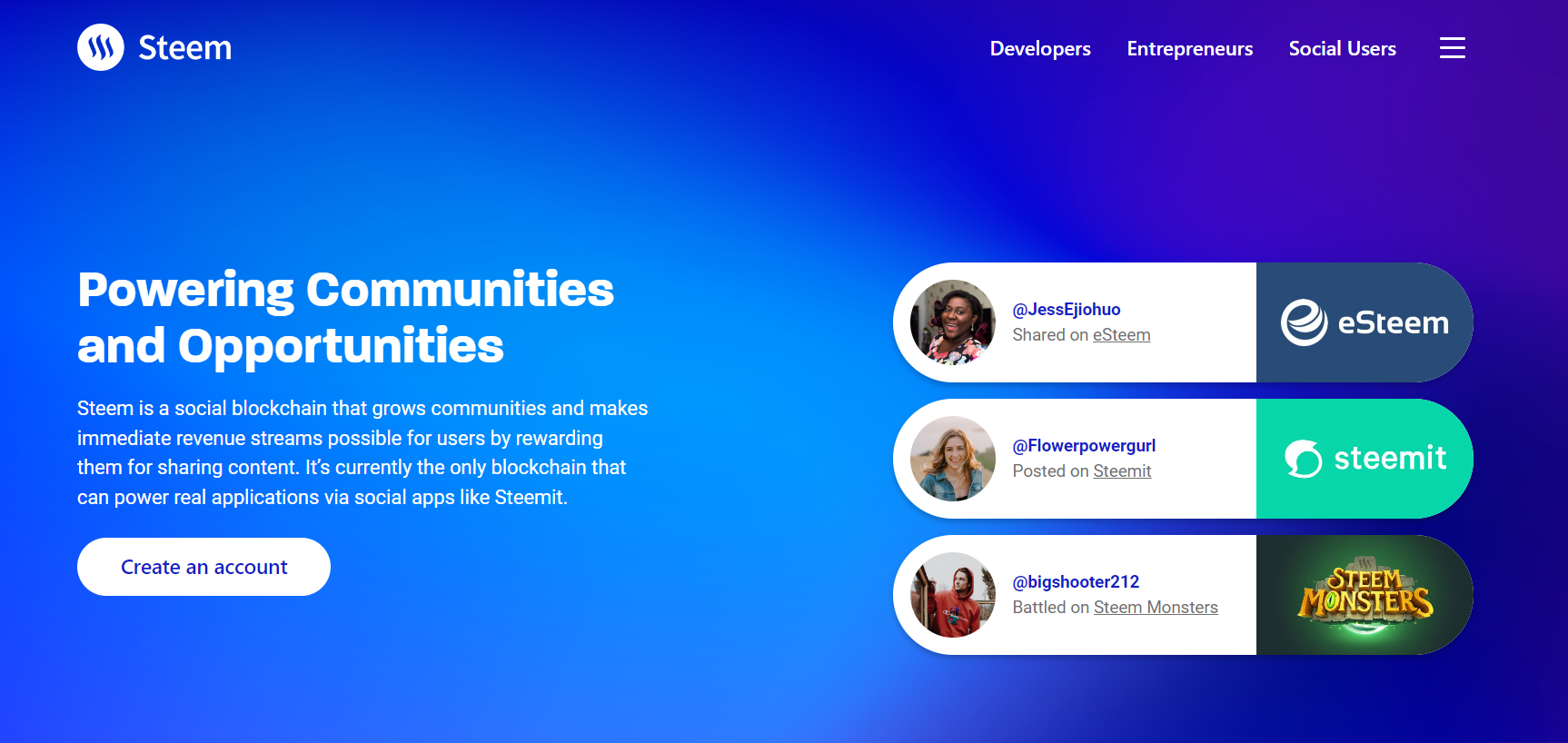
Steem is a unique social blockchain that aims to revolutionize the way online communities interact and generate revenue. Unlike traditional social media platforms where the company behind the platform benefits the most, Steem empowers individual users by rewarding them for sharing content. This is made possible through Steem-based social apps like Steemit, which allow users to earn value for their contributions. The platform is designed to be fast, free, and scalable, offering a blockchain-based solution that addresses many of the limitations of conventional social networks.
What sets Steem apart is its focus on decentralization and community empowerment. Users essentially become shareholders in the platform, earning value for their contributions. This flips the traditional model of social networking on its head, giving more power back to the users. Steem aims to bring the benefits of blockchain technology to social networking, providing a more transparent, efficient, and community-centric platform.
Key features of the platform:
- Smart Media Tokens (SMTs): SMTs on the Steem blockchain act as native digital assets. These tokens can be integrated into web applications, creating incentives for user participation and platform growth.
- Delegated Proof of Stake (DPoS): Steem uses a unique DPoS consensus mechanism for block production, involving elected witnesses rather than traditional mining. This approach ensures efficient and secure block generation.
- Diverse Token Ecosystem: Steem offers several types of tokens – STEEM, Steem Dollars (SBD), and Steem Power (SP), each serving different functions within the ecosystem. STEEM acts as the primary cryptocurrency, SBD as a stablecoin, and SP offers more influence in the network for long-term holders.
The Role of Web3 Social Media
The Importance of Decentralization
In a world where data breaches, censorship, and centralized control are becoming increasingly common, the concept of decentralization serves as a breath of fresh air. The shift from a centralized to a decentralized model brings about a host of benefits that are crucial for the evolution of social media. Decentralization ensures that no single entity can control the narrative, manipulate algorithms, or misuse user data. It places the power back into the hands of the users, allowing for a more democratic and transparent digital ecosystem.
But the advantages of decentralization go beyond just control and power dynamics. It also has profound implications for data privacy and security. In a decentralized system, your data isn't stored on a single server that could be a potential target for hackers. Instead, it's distributed across a network, making unauthorized access significantly more challenging. Moreover, many Web3 platforms offer end-to-end encryption as a standard feature, ensuring that your conversations and content remain confidential. This level of security is especially important in an era where data is often considered more valuable than gold.
Web3 vs. Web2: A Comparative Analysis
The transition from Web2 to Web3 is akin to a paradigm shift, altering the way we interact with the digital world. While both have their merits, understanding the differences between the two can offer valuable insights into the future of online platforms, especially social media.
Ownership
In Web2 platforms, the ownership of content and data predominantly lies with the platform itself. Users are merely participants who must adhere to the terms and conditions set by the platform. In contrast, Web3 platforms give users ownership of their content and data, often through blockchain technology. This shift empowers users to have more control over their digital assets, from posts and photos to personal information.
Monetization
Web2 platforms primarily rely on advertising for revenue, often at the expense of user experience and privacy. Users are the product, and their data is sold to the highest bidder. Web3, however, introduces a new monetization model that benefits the user directly. Through tokenomics and cryptocurrency, users can earn from their interactions and contributions, making the platform more equitable. So, Web3 platforms are perfect places for implementing Web3 marketing strategies.
Privacy
Data privacy is one of the most glaring issues in Web2 platforms. Centralized servers are susceptible to hacks, and there's often a lack of transparency in how user data is used. Web3 platforms address this by decentralizing data storage and offering robust encryption, making unauthorized access to user data more difficult.
User Experience
Web2 platforms offer a more curated experience, controlled by algorithms that decide what content appears on your feed. While this can make the platform more engaging, it also raises concerns about echo chambers and the suppression of diverse viewpoints. Web3 platforms, on the other hand, offer a more organic and less manipulated user experience, thanks to their decentralized nature.
In Conclusion
In 2025, with decentralized control, enhanced data privacy, and equitable monetization models, Web3 social media platforms are poised to redefine our online interactions in ways we've never imagined.
From ownership and monetization to privacy and user experience, the advantages of best Web3 are compelling. As we stand on the cusp of this exciting new era, one thing is clear: the future of social media is decentralized, and it's closer than we think. Are you ready to be a part of it?
FAQ
How Do Web3 Social Media Platforms Differ From Traditional Ones?
Web3 Social Media Platforms differ in several ways:
- Decentralization: Web3 platforms are typically decentralized, meaning there's no single central authority or server controlling user data.
- User Ownership: Users have more control over their data and content, often owning their digital assets and profiles.
- Cryptocurrencies: Many Web3 platforms use cryptocurrencies or tokens for various purposes, including tipping content creators and participating in governance.
- Transparency: Transactions and interactions on Web3 platforms are often recorded on a public blockchain, adding a layer of transparency.
Can I Earn Money on Web3 Social Media Platforms?
Yes, on many Web3 platforms, users can earn cryptocurrencies or tokens for creating and engaging with content. This often involves mechanisms like content monetization, token rewards, and decentralized applications (DApps) that enable users to generate income.
Is My Data More Secure on Web3 Social Media Platforms?
In general, Web3 platforms aim to enhance user privacy and data security compared to traditional social media platforms. However, it's crucial to research each platform's specific features and security protocols to understand the level of protection it offers for your data.
How Can I Get Started With Web3 Social Media Platforms?
To get started with Web3 social media platforms:
- Research available platforms and choose one that aligns with your interests and goals.
- Set up a digital wallet to store cryptocurrencies or tokens if required.
- Follow the platform's onboarding process, create a profile, and start engaging with the community.
Are There Any Risks Associated With Using Web3 Social Media Platforms?
Yes, there are risks associated with Web3 platforms, including the potential for cryptocurrency volatility, scams, and regulatory uncertainty. Users should exercise caution, conduct due diligence, and be aware of the risks involved when participating in Web3 communities.
How Can I Ensure My Online Safety While Using Web3 Social Media Platforms?
To ensure your online safety on Web3 platforms:
- Use strong, unique passwords and consider using a password manager.
- Enable two-factor authentication (2FA) when available.
- Be cautious when sharing personal information and financial details.
- Stay informed about the platform's security features and best practices.
What Are the Benefits of Using Web3 Social Media?
- Ownership: Users have ownership of their content and personal data.
- Monetization: Potential for direct monetization through tokens or cryptocurrency.
- Censorship Resistance: Reduced ability for central entities to censor content.
- Privacy: Enhanced privacy options due to decentralization.
- Community Governance: Users can have a say in the platform's rules and policies through governance tokens.
Are Web3 Social Media Platforms Free to Use?
While many Web3 platforms are free to access, some functions may require transaction fees, also known as "gas fees," for activities like posting content or making transactions, which are paid in cryptocurrency.
Can I Port My Data From a Traditional Social Media Platform to a Web3 Platform?
Some Web3 platforms may offer tools to import your data from traditional platforms. However, due to differences in data structures and privacy regulations, this process can vary in complexity.
Will Web3 Social Media Platforms Replace Traditional Ones?
While Web3 social media platforms offer innovative features, whether they will replace traditional platforms depends on user adoption, regulatory responses, and the continued evolution of the technology. They may coexist or serve different user needs.




